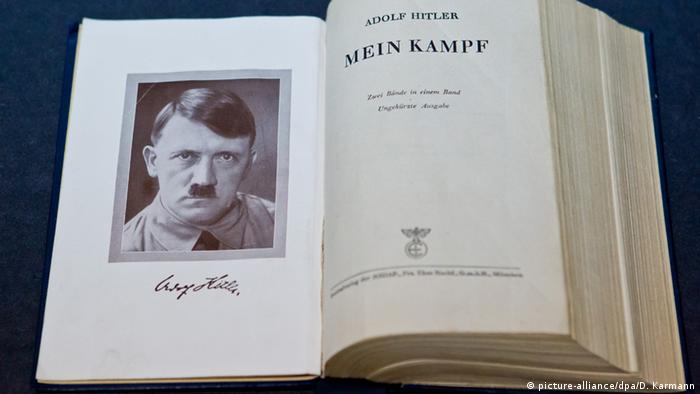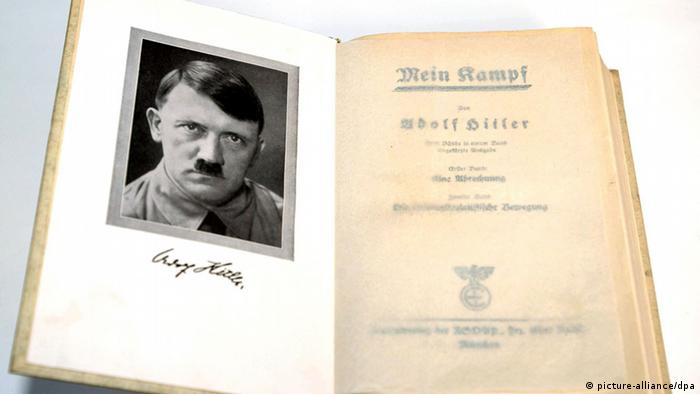Ahead of the release of an annotated version of Adolf Hitler's "Mein Kampf," the president of the German Teachers' Association has suggested that schools should study the text. In an interview with DW, he explains why.
Hitler's two-volume manifesto "Mein Kampf" outlined the soon-to-be Nazi dictator's political philosophy and contained numerous anti-Semitic remarks that some historians argue foreshadowed his plans to eradicate the Jews.
Originally appearing in 1925 and 1926 , the two volumes have not been published in Germany since the end of World War II. The Institute of Contemporary History in Munich now plans, however, to publish a critical, annotated version of "Mein Kampf" in January 2016.
DW: What do you think can be achieved by school pupils studying Hitler's "Mein Kampf"?
Josef Kraus: I don't think that all of "Mein Kampf" should be read in schools. Instead, what I've proposed is that excerpts should be read in sixth forms in the hope that young people can become immunized and resistant to extremist notions. It would show them how an ideal or ideology can lead to a catastrophe such as the 12 years of mass murder seen in 12 years of German history.
At 16 to 18 years old, sixth-form pupils can still be very impressionable. Do you have any concerns that reading "Mein Kampf" could have the wrong effect?
That is a question of having professional and educated teachers. I trust our teachers, in particular those teaching history, politics, ethics and religion. Of course, the issue must be approached sensitively. National Socialism is a core topic of our history classes, and I would hope, for example, that every German pupil leaving school, after appropriate preparation and discussion, has visited a concentration camp.
One shouldn't overcomplicate the proposal to discuss extracts from "Mein Kampf." Just two or three passages could be studied over the period of a couple of hours when pupils are already learning about National Socialism.
 |
| President of the German Teachers' Association, Josef Kraus |
Which extracts of "Mein Kampf" would you deem as "teachable"?
From what we've heard, about 4,000 copies of the book will initially be published at the price of 60 euros (about $65) each. I recommend that Germany's 16 culture ministers commission a smaller version of 50, 60, 80 pages that one can read alongside the comments and information sources. This would be extremely helpful for the school pupils. In particular, I'd like to see extracts that make the hate against Jews very clear and reveal that Hitler obviously had a huge war in mind.
With right-wing populism on the increase, and groups such as HoGeSa and PEGIDA marching the streets of Germany, is now the best time to be studying "Mein Kampf"?
What's much more dangerous is remaining silent or completely banning the book. Nowadays, with the power of the Internet, everyone has access to everything. So it's more important to me that something like this can be discussed in a differentiated and critical manner. One thing we know from the Federal Department for Media Harmful to Young Persons is that when young people are prohibited from accessing something like a banned text, their curiosity increases, and then we have no chance of influencing them at all.
Around 100,000 Jews live in Germany today. Would studying "Mein Kampf" be problematic for or disrespectful to the Jewish population?
I know many Jewish people, including the president of the Central Jewish Council, who could also imagine the approach to the texts I have described. The former president of the Central Jewish Council, Charlotte Knoblauch, has spoken out against it, but others agree with me. One can discuss the topic in many different ways. The question is how to implement it.
I think it's in the interest of our Jewish fellow citizens to deal with this part of German history authentically. It has nothing to do with propaganda, nothing to do with nostalgia or a return to the National Socialist period. Instead it's to do with our young people being immunized against extremist views. And, of course, I would hope that Jewish citizens would play a role in how this is approached in schools, and participate in these lessons.
Josef Kraus has been the president of the German Teachers' Association since 1987. Between 1993 and 1996 he was a member of Germany's Federal Department for Media Harmful to Young Persons (BPjM), a government agency responsible for indexing media works alleged to have a deleterious effect on young people.



